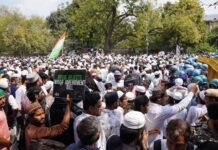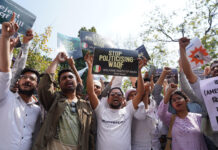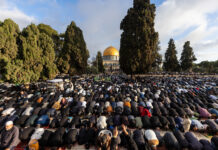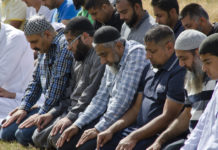Two of the largest feuding Muslim groups in India have united against the recent “terror” arrests of Muslim youth, The Indian Express reports.
The Barelvi’s most influential scholar in India paid an unprecedented visit to Darul Uloom Deoband earlier this week to forge a unity between the two rival groups within the Sunni majority of Indian Muslims.
The reason for this effort at unity was prompted by “the tears of a mother” of a young Muslim man who was falsely accused of terrorism and arrested.
“Our children are being targeted,” said Maulana Tauqeer Raza Khan, who is the great-grandson of the Barelvi movement’s founder, Maulana Ahmad Raza Khan.
“It is now time to get together and fight those picking up and putting young Muslims behind bars,” he told The Indian Express.
“Look at the Malegaon case. Our boys are sentenced or on trial in jail for years, even decades, and then finally released. By then their reputations are tarnished and their self-esteem is gone. This has to be fought as one, there are no good Muslims and no bad Muslims. We are all being victimised through a differential policy by the state.”
Students and scholars at Deoband were taken back at the sight of the most prominent Barelvi cleric arriving at the “mohtamim” or head of Darul Uloom, Asia’s most influential Muslim seminary.
Subscribe to our newsletter and stay updated on the latest news and updates from around the Muslim world!
Maulana Tauqeer was warmly received by the mohtamim. Tea and snacks followed with a conversation on the need for “unity”.
The hour-long meeting with about 25-30 people present, also discussed the importance of avoiding theological debates, and finding common ground to battle issues facing India’s Muslim community.
“It was the tears of the mother of an accused most recently arrested under charges of plotting a bomb explosion, Shakir Ansari’s mother, that drove me to make the sudden visit,” Maulan Tauqeer said.
Earlier this month, Delhi police’s special cell had picked up 13 young Muslim men in raids on Delhi’s Uttar Pradesh district, and claimed to have busted a “Jaish-e-Mohammed” cell, set up to “avenge” a series of “anti-Muslim” incidents by carrying out bomb attacks.
Subsequently, Delhi police released 10 of them for “lack of evidence”.
The Barelvis and Deobandis came together before for a brief period of time in 1972 when there was a feeling that Muslim Personal Law was under attack, which led to the formation of the Muslim Personal Law Board.
Today, it is the threat to the existence of the Muslim community itself which has brought the two sides together.
You can read Seema Chishti’s full article on the Indian Express website.






















